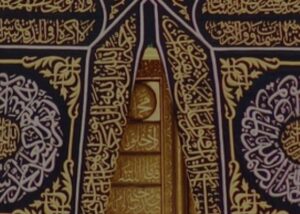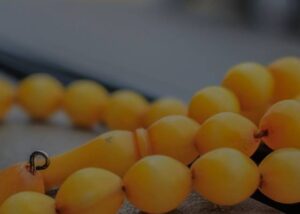Quran
Hadith
Islamic Text
بِسْمِ اللَّهِ الرَّحْمَنِ الرَّحِيمِ
In the Name of Allah Most Merciful Most Kind
Short Answer
One of the great scholars of the Sahabah used Taweez and this is mentioned in Hadith narrations. The Sahabi that did this is Sayidina Abdullah bin Amr bin al-Aas. Further, this Sahabi used Tawwez for his children who were young:
حَدَّثَنَا عَلِيُّ بْنُ حُجْرٍ قَالَ: حَدَّثَنَا إِسْمَاعِيلُ بْنُ عَيَّاشٍ، عَنْ مُحَمَّدِ بْنِ إِسْحَاقَ، عَنْ عَمْرِو بْنِ شُعَيْبٍ، عَنْ أَبِيهِ، عَنْ جَدِّهِ، أَنَّ رَسُولَ اللَّهِ صَلَّى اللَّهُ عَلَيْهِ وَسَلَّمَ، قَالَ: “إِذَا فَزِعَ أَحَدُكُمْ فِي النَّوْمِ فَلْيَقُلْ: أَعُوذُ بِكَلِمَاتِ اللَّهِ التَّامَّاتِ مِنْ غَضَبِهِ وَعِقَابِهِ وَشَرِّ عِبَادِهِ، وَمِنْ هَمَزَاتِ الشَّيَاطِينِ وَأَنْ يَحْضُرُونِ فَإِنَّهَا لَنْ تَضُرَّهُ”. فَكَانَ عَبْدُ اللَّهِ بْنُ عَمْرٍو، يُلَقِّنُهَا مَنْ بَلَغَ مِنْ وَلَدِهِ، وَمَنْ لَمْ يَبْلُغْ مِنْهُمْ كَتَبَهَا فِي صَكٍّ ثُمَّ عَلَّقَهَا فِي عُنُقِهِ. هَذَا حَدِيثٌ حَسَنٌ غَرِيبٌ
Ali bin Hajar narrated to us, saying: Ismail bin Ayyash narrated to us, from Muhammad bin Ishaq, from Amr bin Shuaib who narrated from his father who narrated from his grandfather, that the Messenger of Allah ﷺ said: “If one of you becomes frightened during sleep, then let him say: ‘I seek refuge in the perfect words of Allah from His anger, His punishment, and the evil of His creatures. And from the whisperings of the devils, and their presence. Then indeed, they will not harm him.” Abdullah bin Amr used to teach it to those of his children who had attained maturity. As for those of them who had not, he would write it on parchment and hang it around the neck. (Sunan al-Tirmidhi 3528, Hasan).
The above Hadith has also been narrated by: Imam Ahmad (6696); Abu Dawood (3893); Hakim (2010); and many others. The narration clarifies that Sayidina Abdullah bin Amr bin al-Aas (May Allah Most High be pleased with them both) used to have his young children wear Taweez. As for older children, they were encouraged to recite and not wear Taweez.
Taweez only for children
Based upon the above narration, it is correct to say that Taweez should only be used for children who are incapable of reading. Therefore, for those who have the ability to recite, they should recite and not wear Taweez. Additionally, the practice of recitation rather than wearing Taweez is the Sunnah. Therefore, it is superior. Furthermore, the Sunnah of our beloved Prophet ﷺ is always superior.
Is the Hadith weak?
Some recent and contemporary scholars raised concerns with the Hadith above. This was due to the fact that Muhammad bin Ishaq is considered to be a Mudalis and narrated using inexplicit language (عن). As such, this is a justifiable contention. However, it is important to note that Muhammad bin Ishaq has been confirmed to have narrated from Amr bin Shuayb:
وَحَدَّثَ عَنْ: أَبِيْهِ, وَعَمِّه مُوْسَى بنِ يَسَارٍ, وَعَنْ أَبَانِ بنِ عُثْمَانَ فِيْمَا قِيْلَ, وَعَنْ بُشَيْرِ بنِ يَسَارٍ, وَسَعِيْدِ بنِ أَبِي هِنْدٍ, وَسَعِيْدٍ المَقْبُرِيِّ, وأبي سفيان طلحة ابن نَافِعٍ, وَعَبَّاسِ بن سَهْلِ بنِ سَعْدٍ, وَعَبْدِ الرَّحْمَنِ بنِ هُرْمُزَ الأَعْرَجِ, وَعَمْرِو بنِ شُعَيْبٍ. (سير أعلام النبلاء)
He narrated from: his father, and his uncle Musa bin Yassar, and from Aban bin Uthman, as was mentioned. Also, Bashir bin Yassar, Saeed bin Abi Hind, and Saeed Al-Maqaburi, Abu Sufyan Talha Ibn Nafi’, Abbas Ibn Sahl Ibn Saad, Abd al-Rahman Ibn Hurmuz al-Araj, and Amr Ibn Shuaib. (Imam Shams al-Deen al-Dhahabi, Siyar Alam).
As seen in the Nass above, Imam al-Dhahabi confirmed that Muhammad bin Ishaq did indeed take from Amr bin Shuayb. Thus, the view of Imam al-Tirmidhi, that the Hadith is Hasan (strong) is bolstered.
Which Taweez are permitted
In any case, the above narration cannot be used to imply absolute permissibility for Taweez. Rather, there are many conditions that must be fulfilled for Taweez to be permitted. Amongst them are the following:
- The Taweez must be written in clear Arabic.
- There must be no numbers, shapes, boxes etc.
- The Taweez must be Quranic verses, Prophetic supplications or the Holy Names of Allah (Most High) and nothing else.
For a Taweez to be permissible, it cannot be a mixture of that which is recognised and permitted and that which is not. Some Muslims are misguided by people who present them with Taweez that have verses of Quran or Sunnah Dhikr together with numbers, boxes or symbols.
وَتِلْكَ الرُّقَى الْمَنْهِيُّ عَنْهَا الَّتِي يَسْتَعْمِلُهَا الْمُعَزِّمُ وَغَيْرُهُ مِمَّنْ يَدَّعِي تَسْخِيرَ الْجِنِّ فَأَتَى بِأُمُورٍ مُشَبَّهَةٍ مُرَكَّبَةٍ مِنْ حَقٍّ وَبَاطِلٍ يَجْمَعُ إلَى ذِكْرِ اللَّهِ وَأَسْمَائِهِ مَا يَشُوبُهُ مِنْ ذِكْرِ الشَّيَاطِينِ وَالِاسْتِعَانَةِ بِمَرَدَتِهِمْ. (نيل الأوطار)
That is the forbidden Ruqyah. It is used by utterers and others. He claims subjugation of the Jinn. He engages in obscure matters, a combination of truth and falsehood. He combines the Dhikr of Allah (Most High) and His Names with corruption, such as mentioning devils, seeking their help, and seeking refuge in their leaders. (Imam Muhammad bin Ali al-Shawkani, Nayl al-Awtar).
Conclusion
Although we see the blessed Sahabi Sayidina Abdullah bin Amr bin al-Aas (May Allah Most High be pleased with them both) using Taweez for children who cannot recite, this denotes permissibility not superiority. The Sunnah of our Prophet ﷺ is always superior. Furthermore, the practice of our blessed Prophet ﷺ was to recite over young children and not use Taweez.
And Allah Most High Knows Best.
–Answered by Shaykh Noorud-deen Rashid (23.11.23)






